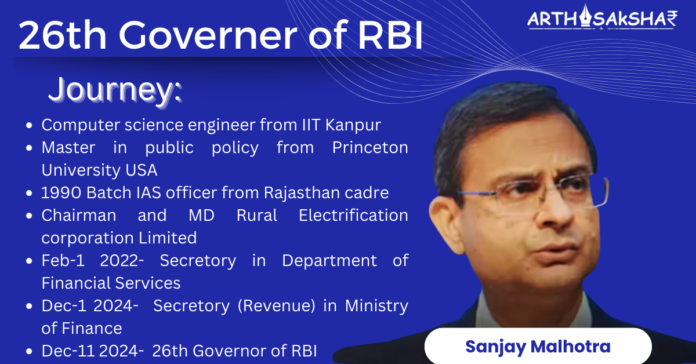Sanjay Malhotra 1990 batch IAS Officer of Rajasthan Cadre, a computer science Engineer from IIT Kanpur, Revenue secretory is announced as Governor of RBI on 9th December 2024.Tenure of the New RBI Governor is 3 years
Early Life:
Sanjay Malhotra was born on Feb 14, 1968 in Bikaner Rajasthan. He is BTech in Computer Science from IIT Kharagpur and then completed masters degree in public policy from the Princeton University, USA.
Career:
Newly appointed Governor of RBI Mr. Sanjay Malhotra has more than 30 years long career where he has served at various departments and positions. Some are mentioned below
- IAS Officer of Rajasthan Cadre- 1990.
- Chairman and managing director of Rural Electrification Corporation.
- Additional secretary in the Ministry of Power.
- Project coordinator with the United Nations Industrial Development Organization (UNIDO).
- personal secretary to the minister of state for space and minister of state for
micro, small and medium enterprises (MSMEs). - Secretary, Department of Financial Services (DFS).
- Revenue secretary.
RBI was established on April 1, 1935 with the provisions of the Reserve Bank of India Act 1934. The central office of RBI presently is in Mumbai. Since nationalization 1949, the RBI is fully owned by Government of India . RBI have 33 offices at different locations.
History of RBI
Reserve Bank of India is a statutory body. RBI was established through Reserve Bank of India Act, 1935. RBI is not a constitutional body. Although RBI has considerable institutional independence, it is under the control of the Ministry of Finance, Government of India
Functions of RBI
- RBI acts as a Banker to government and Banker to Banks.
- It regulates and supervise payment and settlement system.
- It issues, exchange and destroy currencies and also manage foreign exchange.
- It formulates, implement and monitors the monitory policy.
It Constitutes:
- Official Directors
- Full-time : Governor and not more than four Deputy Governors
- Non-Official Directors
- Nominated by Government: ten Directors from various fields and two government officials
- Others: four Directors – one each from four local boards
